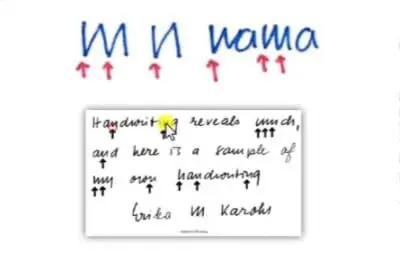In the 10 Personality Aspects of KAROHS, one aspect is called Thinking Pattern. This aspect is about how a person absorbs or processes information. There are four major traits in this Thinking Pattern aspect, one of which is analytical thinkers.
Those with analytical thinking possess specific traits that shape the way they solve problems, make decisions, and communicate. Let’s learn about what analytical people are like, their handwriting characteristics, and some job recommendations for them.
What Are Analytical Thinkers Like?
Analytical thinkers pay close attention to detail and strive for accuracy and deep understanding. This helps them make informed decisions. They rely on facts and data.
People with analytical thinking are driven by understanding and the “why” to motivate them in problem-solving and decision-making. They prefer to delve deeply into the root causes of a problem, also enjoy solving puzzles and brain-teasing games to train their analytical skills. For them, this isn’t just a task, but a passion to satisfy their thirst for knowledge.
They understand problems deeply, seek out extensive information, and find the right solution. Their thorough examination distinguishes them as individuals who seek a comprehensive understanding of the “what,” “why,” and “how.”
People with this type of thinking pattern seek to find the right answer by carefully gathering and analyzing information before making a decision. They investigate in detail, ensuring it is error-free.
Integrating data and numbers plays a crucial role in their thinking process. This offers a systematic approach to analyzing information and drawing logical conclusions. They strive to make sound decisions based on data rather than hunches or intuition.
For example, people with analytical thinking might use data to identify trends, make forecasts, and develop strategies based on statistical evidence in a business environment.
Characteristics of Analytical Thinkers’ Handwriting

Angles/sharpness at the bottom of the letters “n” and “m”
This is one example of the handwriting characteristics of someone with an analytical thinking pattern. There are angles/sharpness at the bottom of the letters “n” and “m.”
This means the writer prefers to analyze the information they receive. They are not easily convinced. Writers feel the need to analyze, understand the cause and effect, or reason behind information before making a decision. They tend to frequently questioning the reason behind information or statements.
Some Professions for People With Analytical Thinking
Here are some jobs that typically require analytical thinking to help them carry out their responsibilities:
1. Business Analyst
A business analyst is a person who processes, interprets and documents business processes, products, services and software through data analysis. As a business analyst, you will be responsible for introducing new processes, plus reworking existing methods to make them more efficient.
2. Criminologist
In their work, criminologists use analytical thinking to help solve problems in the criminal justice system and examine issues. It usually involves structuring ideas and using complex theories to solve many problems faced by the criminal justice system.
3. Economists
An economist’s expertise is to apply economic concepts and theories and develop them through research activities. Economists apply analytical thinking to their work to help them explain economic phenomena.
4. Accountants
The basic task of an accountant is to supervise, calculate, and also make financial reports at an agency, company, or institution where they work. Accountants use analytical thinking skills to help them find and solve problems.
So, those are some examples of careers for analytical thinkers. For those with this type of thinking pattern, striving for perfection in decisions can also pose challenges such as spending excessive time on tasks or work, being overly critical, and often experiencing stress. Furthermore, their focus on information gathering and accuracy can sometimes make them appear less empathetic towards others.
Are you an analytical thinker? Or an investigative thinker? Be careful, don’t be mistaken. Come and get to know yourself better through your handwriting by joining the handwriting analysis course at KAROHS School!
Start from scratch with the applicative course, then progress to the comprehensive and master’s courses! You’ll learn a wealth of personality through handwriting analysis and be guided to become an expert handwriting analyst. Join now, don’t miss out!


